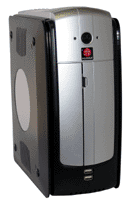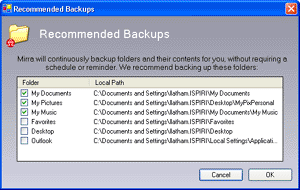Startup Addresses Buildup Of Digital Content
The Mountain View, Calif.-based company Wednesday unveiled its first product: Mirra, a personal server designed to enable PC users to easily manage, protect, remotely access and share digital content, including documents, photos, e-mail and other files. Richard Mandeberg, Ispiri's CEO, said Mirra is earmarked for the consumer, SOHO and small-business markets, where many users are seeking ways to rein in and safeguard their mounting number of digital files.
"We are targeting anybody who doesn't have on-staff or local IT support, who has a small network, who has one or multiple computers and who has shared broadband. That's 20-something million users, between homes, SOHOs and small businesses. It's a big market," Mandeberg said. "One of Ispiri's founding beliefs is that the value of digital content--whether you're looking at it as a business professional or a consumer--is now more than the value of the PC that it's on. If you have digital music, photos, documents and other content on a computer, you need those files to stay around a lot longer than you know the computer is going to be around."

\
Ispiri's Mirra combines an appliance with software and free services, providing backup/restore, remote access and file sharing functions for digital content.
More than 60 beta users, primarily SOHO professionals and consumers, are testing Mirra, Mandeberg said. The product is a response to the swell of digital content that arose amid the explosive growth of technologies such as broadband, digital photography and wired/wireless networking, said Leslie Latham, vice president of marketing at Ispiri.
"It's aimed at the so-called digital consumer and small-office professionals, who need an easier and more reliable way to store, protect, share and remotely access their digital content," Latham said.
Focus-group studies and the beta tests showed that many of those users think they're losing their grip on their buildup of digital files, she added. "What our target customers have in common is the sense that as their digital content has grown, they're increasingly feeling vulnerable and that it's all sort of unmanageable," she said. "Overall, the feeling is, 'I know there are solutions on the market to help me with this today, but they're all too complicated.' They want one way to bring it all together."
Mirra combines an appliance with software and free services. The compact, tower-style unit contains a 120-Gbyte hard drive; backup/restore, remote access and sharing applications; a 10/100 Ethernet connection; USB 2.0 ports; and audio/video connections. A Linux-based product, Mirra works with computers running either Windows or Linux, and it can be expanded by adding a bigger internal drive or connecting external drives.
When users install Mirra client software on a PC or a notebook connected to the appliance, the computer automatically discovers the device. The software then searches the computer for files to back up (documents, e-mail, photos, music, etc.) and then recommends a list of named backup folders, which users can customize. Once the designated files are backed up, they're automatically enabled for remote access. "Supersync" and versioning functions work in the background to keep file changes synchronized between the PC and Mirra, as well as to retain recent file versions. Deleted files can be restored in one click.
Users access files remotely through a password-protected Web site, www.mirra.com. Those permitted to access and share files are identified and authenticated by their e-mail addresses. The Mirra service e-mails users when a friend or co-worker wants to share files. The recipient then goes to the Mirra site, logs in and then sees the folders containing the files that the sender designated for access. Transmissions for remote access and sharing are encrypted, and the content being accessed remains behind the firewall on the Mirra appliance.
"The service doesn't store any of your data. Your data is always stored in your home or business," Mandeberg said. "All the service is doing is authenticating that when it opens up a connection between your appliance and the service, it knows who the secure identities are. It acts as a gatekeeper."

\
Mirra's software searches the digital content on a user's computer and gives a list of recommended files to back up.
Mirra's performance is monitored as well. "We have a service in the background--invisible to the customer--that is constantly checking to see that your Mirra is healthy and doing what it needs to do," Latham said.
Mirra is scheduled to ship Oct. 15, according to Mandeberg. Ispiri is mulling a $399 to $499 price range for the product, but it will probably end up at $399, he said.
Plans initially call for Mirra to be sold through the company's Web site (www.ispiri.com), with broad channel and retail distribution to follow in early 2004 after the Consumer Electronics Show (CES) in Las Vegas, Latham said. "At CES, we will be actively recruiting resellers. Today, we have a working agreement with an existing national retailer that has been beta-testing the product with an eye toward a January rollout," she said.
VARs conceivably could sell Mirra as a "network in a box" or bundle it with other products as part of a bigger small-office/home network solution, said Mandeberg and Latham. Other potential channel offerings with Mirra include remote storage, backup and archiving services as well as customized backup, remote access and file sharing solutions for specific verticals, such as law or accounting, they said.
"One of the things we want to figure out, starting in October, is what the right solution for retail is and what the right solution for VARs is," Latham said. "We want to better understand what Mirra's value propositions are."
Ispiri was founded in June 2002 by chairman Tim Bucher, who also serves as vice president of Macintosh systems development at Apple. He previously was vice president of consumer products at Microsoft and vice president of hardware engineering at WebTV Networks, which is now owned by Microsoft. Mandeberg formerly was CEO of iQCommerce, president of Siren Technologies and president of Editel, while Latham previously held executive posts at Sony, Apple and LucasArts. Ispiri's product team--Sandy Benett, vice president of engineering; Bret Savage, chief client architect; and Krishna Bandaru, chief services architect--have experience from companies such as PalmSource, Apple, Lipstream Networks, FreeGate, Weave Innovations and Intel.